List of Speakers of the British House of Commons
This is a list of Speakers of the House of Commons of Great Britain from 1707 to 1800 and the House of Commons of the United Kingdom from 1801.
For the 'prolocutors' and speakers of the House of Commons of England, see List of Speakers of the House of Commons of England.
Numbering of Speakers
The succession numbers, used in the body of the tables in this article, are split between different eras. In each table the numbers are based upon the number of individuals to hold the office of Speaker in the era covered. Individuals with split terms retain the same succession number throughout a table.
An alternative approach is to give a different succession number for each split term and to number continuously through the English, British and UK Parliaments. Based on that alternative approach, Mr Speaker Bercow is enumerated as the 157th Speaker.
List of Speakers
Speakers of the House of Commons of Great Britain 1707–1800
The Kingdom of Great Britain was created by the Acts of Union 1707. At the beginning of 1801, Great Britain was combined with the Kingdom of Ireland to form the United Kingdom of Great Britain and Ireland, with a single House of Commons serving the whole kingdom.
| No.[A 1] | Term of office | Speaker | Portrait | Constituency[A 2] | Peerage | |
|---|---|---|---|---|---|---|
| 1 | 1707 | 1708 | Sir John Smith | 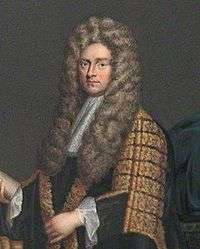 |
Andover | ... |
| 2 | 1708 | 1710 | Sir Richard Onslow[A 3] |  |
Surrey | 1st Baron Onslow |
| 3 | 1710 | 1713 | William Bromley[A 4] |  |
Oxford University | ... |
| 4 | 1714 | 1715 | Sir Thomas Hanmer, Bt[A 5] |  |
Suffolk | ... |
| 5 | 1715 | 1727 | Sir Spencer Compton[A 6] |  |
Sussex | 1st Earl of Wilmington |
| 6 | 1728 | 1761 | Sir Arthur Onslow |  |
Surrey | ...[A 7] |
| 7 | 1761 | 1770 | Sir John Cust, Bt |  |
Grantham | ...[A 8] |
| 8 | 1770 | 1780 | Sir Fletcher Norton[A 9] |  |
Guildford | 1st Baron Grantley |
| 9 | 1780 | 1789 | Sir Charles Wolfran Cornwall |  |
Winchelsea[A 10] | ...[A 11] |
| 10 | 1789 | William Wyndham Grenville[A 12] |  |
Buckinghamshire | 1st Baron Grenville | |
| 11 | 1789 | 1800 | Henry Addington |  |
Devizes | 1st Viscount Sidmouth |
- Notes
- ↑ Numbering is from 1707. It is more usual to number Speakers to include those from the English predecessor body. On that basis Smith is the 125th and Addington is the 135th Speaker.
- ↑ Constituency at the time of first election as Speaker.
- ↑ Onslow was the last Speaker to be defeated in his constituency in a general election.
- ↑ Bromley resigned from the chair to become Secretary of State for the Northern Department. He continued to serve in the House of Commons until his death on 13 February 1732.
- ↑ Hanmer vacated the chair but continued to serve in the House of Commons until 1727.
- ↑ Compton vacated the chair but continued to serve in the House of Commons until 1728.
- ↑ Onslow, the longest-serving Speaker, retired from the chair and the House of Commons. He seems to have been the last Speaker who survived his term by a significant period without being offered a peerage.
- ↑ Cust died shortly after he ceased to occupy the chair.
- ↑ Norton was not re-elected as Speaker in 1780, but retained his seat as an MP until 1782.
- ↑ Cornwall was subsequently MP for Rye 1784–1789.
- ↑ Cornwall died in office.
- ↑ Grenville resigned from the chair to become Home Secretary. He continued to serve in the House of Commons until 1790.
Speakers of the House of Commons of the United Kingdom from 1801
The United Kingdom of Great Britain and Ireland was created in 1801. In 1922 the Irish Free State ceased to be part of the UK. The official name of the United Kingdom was changed to the United Kingdom of Great Britain and Northern Ireland, in 1927.
| No.[B 1] | Term of office | Speaker | Portrait | Parliaments | Party[B 2] | Constituency[B 3] | Peerage | |
|---|---|---|---|---|---|---|---|---|
| 1 | 1801 | Henry Addington[B 4] |  |
1st | Tory | Devizes | 1st Viscount Sidmouth | |
| 2 | 1801 | 1802 | Sir John Mitford | 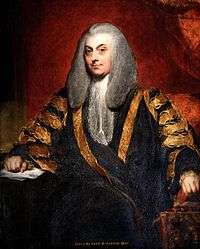 |
1st | Tory | East Looe | 1st Baron Redesdale |
| 3 | 1802 | 1817 | Charles Abbot |  |
2nd, 3rd, 4th, 5th | Tory | Helston[B 5] | 1st Baron Colchester |
| 4 | 1817 | 1835 | Charles Manners-Sutton | 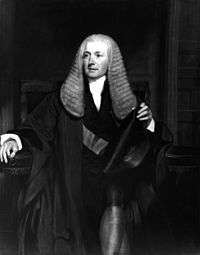 | 5th, 6th, 7th, 8th, 9th, 10th, 11th | Tory | Scarborough[B 6] | 1st Viscount Canterbury |
| 5 | 1835 | 1839 | James Abercromby[2] | 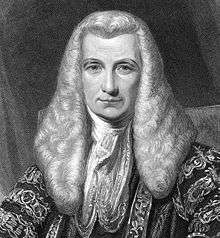 | 12th, 13th | Whig | Edinburgh | 1st Baron Dunfermline |
| 6 | 1839 | 1857 | Charles Shaw-Lefevre | .jpg) | 13th, 14th, 15th, 16th | Whig | North Hampshire | 1st Viscount Eversley |
| 7 | 1857 | 1872 | John Evelyn Denison |  | 17th, 18th, 19th, 20th | Liberal | North Nottinghamshire | 1st Viscount Ossington |
| 8 | 1872 | 1884 | Henry Brand | 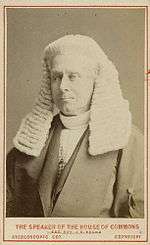 | 20th, 21st, 22nd | Liberal | Cambridgeshire | 1st Viscount Hampden |
| 9 | 1884 | 1895 | Arthur Wellesley Peel |  | 22nd, 23rd, 24th, 25th | Liberal | Warwick[B 7] | 1st Viscount Peel |
| 10 | 1895 | 1905 | William Court Gully |  | 26th, 27th | Liberal | Carlisle | 1st Viscount Selby |
| 11 | 1905 | 1921 | James Lowther |  | 27th, 28th, 29th, 30th, 31st | Conservative | Penrith[B 8] | 1st Viscount Ullswater |
| 12 | 1921 | 1928 | John Henry Whitley | 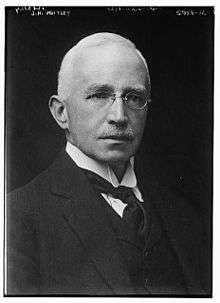 | 31st, 32nd, 33rd, 34th | Coalition Liberal | Halifax | ...[B 9] |
| 13 | 1928 | 1943 | Edward FitzRoy | 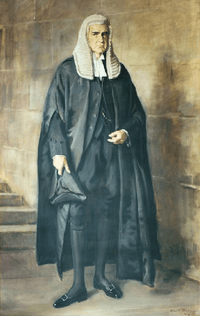 | 34th, 35th, 36th, 37th | Conservative | Daventry | ...[B 10] |
| 14 | 1943 | 1951 | Douglas Clifton Brown |  | 37th, 38th, 39th | Conservative | Hexham | 1st Viscount Ruffside |
| 15 | 1951 | 1959 | William Morrison |  | 40th, 41st | Conservative | Cirencester and Tewkesbury | 1st Viscount Dunrossil |
| 16 | 1959 | 1965 | Sir Harry Hylton-Foster |  | 42nd, 43rd | Conservative | Cities of London and Westminster | ...[B 11] |
| 17 | 1965 | 1971 | Dr Horace King | 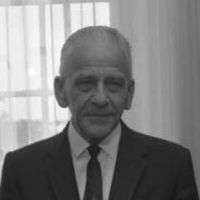 | 43rd, 44th, 45th | Labour | Southampton Itchen | The Baron Maybray-King |
| 18 | 1971 | 1976 | Selwyn Lloyd |  | 45th, 46th, 47th | Conservative | Wirral | The Baron Selwyn-Lloyd |
| 19 | 1976 | 1983 | George Thomas |  | 47th, 48th | Labour | Cardiff West | 1st Viscount Tonypandy |
| 20 | 1983 | 1992 | Bernard Weatherill |  | 49th, 50th | Conservative | Croydon North East | The Baron Weatherill |
| 21 | 1992 | 2000 | Betty Boothroyd | | 51st, 52nd | Labour | West Bromwich West | The Baroness Boothroyd |
| 22 | 2000 | 2009 | Michael Martin |  | 52nd, 53rd, 54th | Labour | Glasgow Springburn[B 12] | The Baron Martin of Springburn |
| 23 | 2009 | John Bercow | | 54th, 55th, 56th | Conservative | Buckingham | ||
- Notes
- ↑ Numbering is from 1801. It is more usual to number Speakers to include those from the English and British predecessor bodies. On that basis Addington is the 135th Speaker and Bercow the 157th.
- ↑ Party allegiance at the time of first election as Speaker. The modern convention is for the Speaker to sever connections with his or her former party. From 1935, the Speaker has sought re-election as such, not using a party label.[1] The general convention is that the Speaker is not opposed by major party candidates at general elections.
- ↑ Constituency at the time of first election as Speaker.
- ↑ Addington resigned from the chair to become Prime Minister. He continued to serve in the House of Commons until 1805.
- ↑ Abbot was subsequently MP for Heytesbury 1802, Woodstock 1802–1806 and Oxford University 1806–1817.
- ↑ Manners-Sutton was subsequently MP for Cambridge University 1832–1835. In 1835 he was defeated for re-election as Speaker, but retained his seat as an MP for a few weeks until he was created a peer. No subsequent Speaker has been defeated or remained in the House of Commons, for more than a few days after leaving the chair.
- ↑ Peel was subsequently MP for Warwick and Leamington 1885–1895.
- ↑ Lowther was subsequently MP for Penrith and Cockermouth 1918–1921.
- ↑ Whitley declined the customary peerage upon his retirement from the chair and the House of Commons.
- ↑ Fitzroy died in office. His widow was created 1st Viscountess Daventry.
- ↑ Hylton-Foster died in office. His widow was created The Baroness Hylton-Foster.
- ↑ Martin was subsequently MP for Glasgow North East from 2005. He resigned the Speakership in 2009. He was the first Speaker to be forced to leave the chair by public pressure since Sir John Trevor was expelled from the House and the chair in 1695.
References
- ↑ Craig, F.W.S. (1989). British Electoral Facts 1832–1987. Politico's Publishing. ISBN 978-0-900178-30-6.
- ↑ Anderson, John (1856). A History of Edinburgh from the Earliest Period to the Completion of the Half Century 1850: With Brief Notices of Eminent Or Remarkable Individuals. A. Fullarton & co. p. 444. ISBN 978-1-85285-581-9. Retrieved 2008-10-21.
- Laundy, Philip (1964). The Office of Speaker. Cassell & Company.
- Marsden, Philip (1979). The Officers of the Commons 1363–1978. Her Majesty's Stationery Office.
- Butler, David; Butler, Gareth (2000). Twentieth Century Political Facts 1900–2000 (Hardcover ed.). Macmillan Press. ISBN 0-333-77221-0.
- Cook, Chris; Keith, Brendan (1975). British Historical Facts 1830–1900. Macmillan Press.
- Cook, Chris; Stevenson, John (1980). British Historical Facts 1760–1830. Macmillan Press. ISBN 0-333-21512-5.
.svg.png)